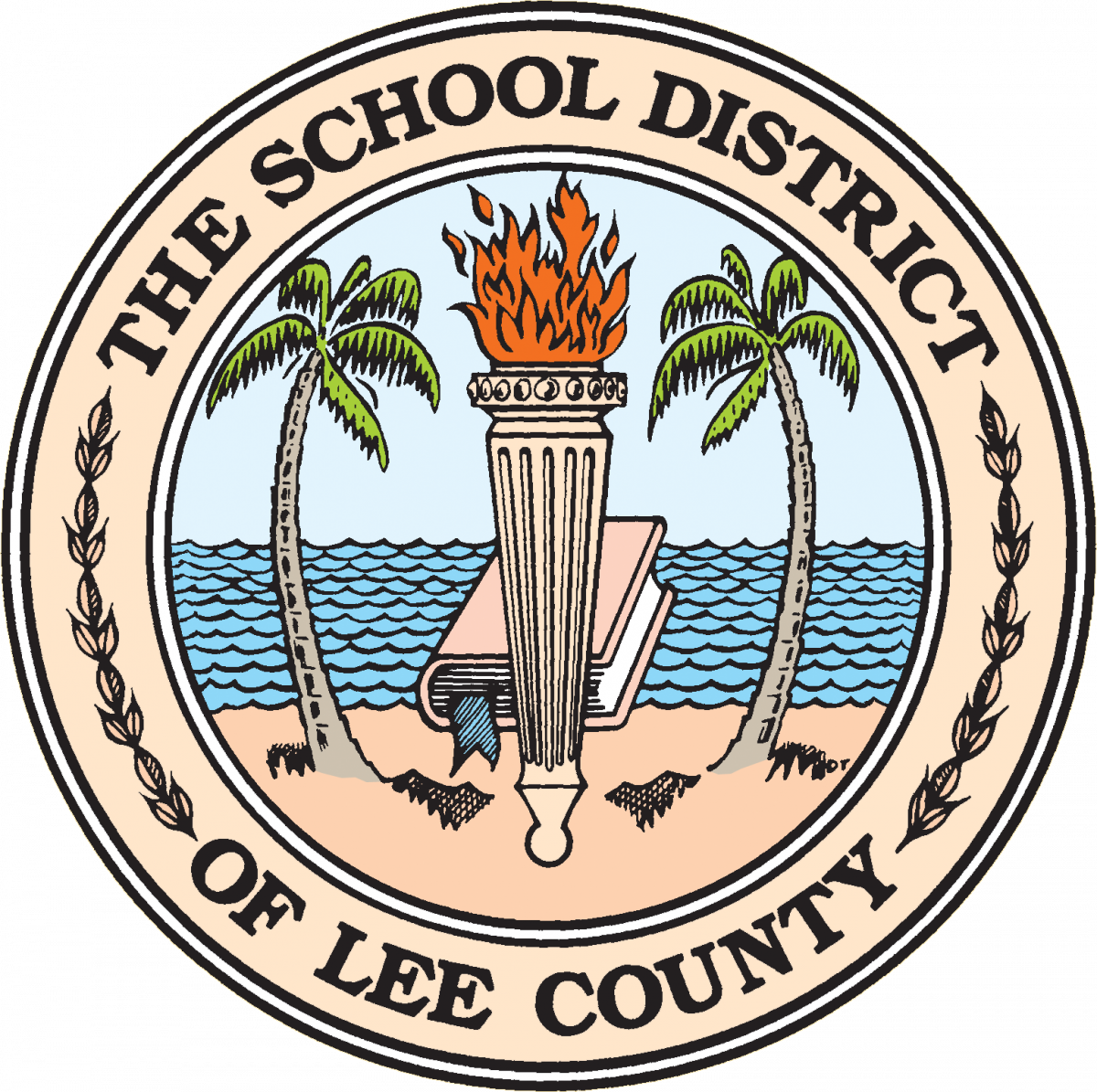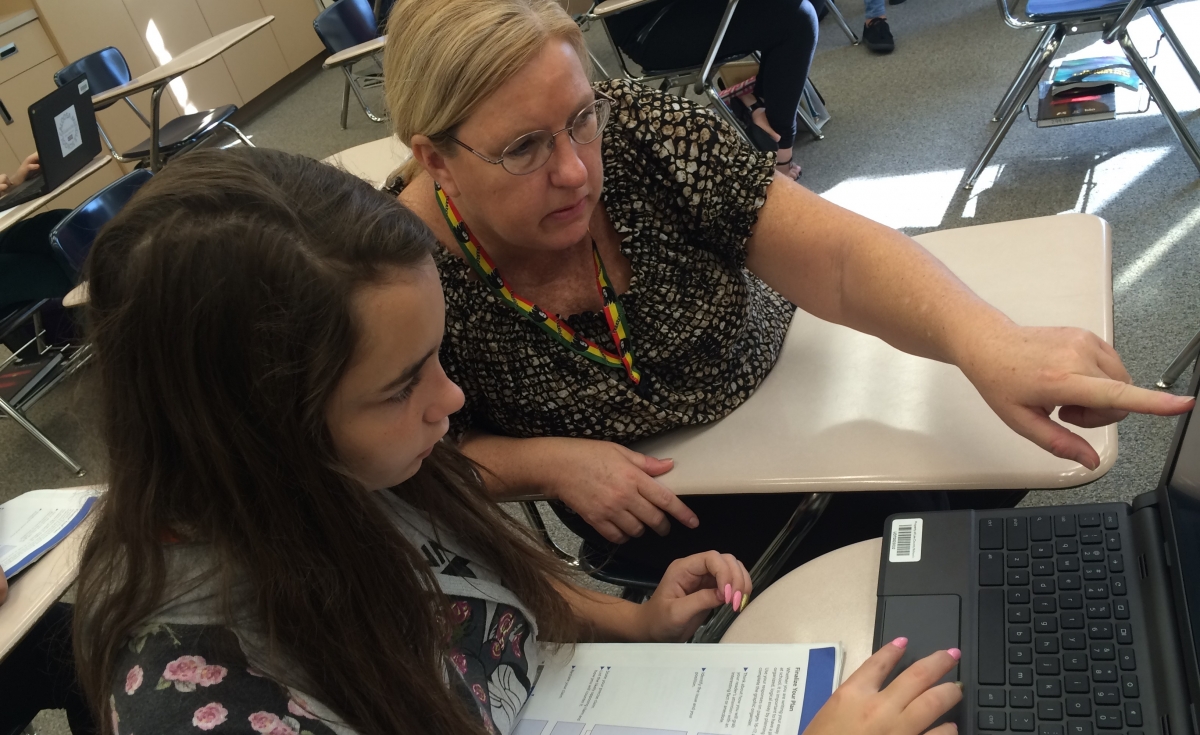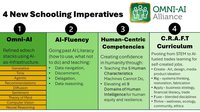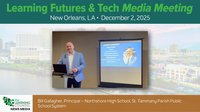Lee County School District in Fort Myers, Florida lies on the southwestern side of the peninsula and is the 9th largest district in the state. Their tech department operates one of the largest and most robust instructional technology networks in the nation, with more than 70,000 computers and mobile devices in use daily. They support a variety of technology solutions from industry leaders, such as Microsoft, Google, Apple, Cisco, Aerohive, Toshiba, NetApp, Dell and Lenovo. With that level of depl oyment, any education executive could imagine the nightmare of organizing log-ins and the myriad of platform sign-ins for teachers, students and administrators. The “single-sign-on” challenge as part of “going digital” and making learning possible anytime, anywhere, was one this district confronted head-on, and they are winning.
oyment, any education executive could imagine the nightmare of organizing log-ins and the myriad of platform sign-ins for teachers, students and administrators. The “single-sign-on” challenge as part of “going digital” and making learning possible anytime, anywhere, was one this district confronted head-on, and they are winning.
As virtually every district across the country has found, an unintended outcome of digital transition is the need to create student and teacher accounts as well as enrolling teachers and students into appropriate classes for all the different digital platforms that are used. Each one may use a different procedure for that information leading to countless hours of work for technology departments and sometimes for teachers who must manually create accounts for their students. The struggle to keep the data in these platforms updated is compounded as new students enroll throughout the year.
It is not unusual for the average student to access learning materials from five to fifteen different digital platforms all with different usernames and passwords. Teachers strive to maintain data privacy and security while making sure each student knows their credentialing information. These issues are frustrating and often lead to decisions to simply not use the digital offerings. Imagine helping a class of five-year-old’s log into a platform with a username and password that is different from the one they use to log onto their computer or tablet. If the teacher loses five minutes per class dealing with signing onto digital applications, that adds up to more than two days of lost instructional time a year.
Providers vs. Tech Integration Personnel
Creating unique data files for each digital provider is also a burden. In smaller districts, there may be only one person who is responsible for this work along with all the other data systems work they are tasked with handling. For districts with frequent new enrollments, the time needed to constantly create, upload and verify files is costly as well. Some systems require manual creation of individual accounts within the platform and this effort may be passed along to teachers or taken care of by district personnel, either way these efforts add to the total cost of ownership for digital systems.
Finding a Solution
Lee County found a solution in IMS Global Learning Consortium’s interoperability standards. Dwayne Alton, Director Information Technology Support, says OneRoster®, Learning Tools Interoperability® (LTI®), and Common Cartridge® (CC®) standards are key to their strategy for handling the data requirements. Alton notes that close collaboration between the Academic Services and Technology departments has been essential. He explains the ongoing communication and regularly sharing updates between the two divisions has been exceptional. Thus, the district has been able to save more than 200 man-hours with the implementation of a plug-and-play ecosystem via IMS standards.
Tools Interoperability® (LTI®), and Common Cartridge® (CC®) standards are key to their strategy for handling the data requirements. Alton notes that close collaboration between the Academic Services and Technology departments has been essential. He explains the ongoing communication and regularly sharing updates between the two divisions has been exceptional. Thus, the district has been able to save more than 200 man-hours with the implementation of a plug-and-play ecosystem via IMS standards.
Lee County School District uses a variety of devices throughout the district including laptops and desktops, Chromebooks, tablets and eReaders, as well as allowing students to bring their own device. Alton comments, “We support at least 6 different operating systems; all to create an environment where anywhere, anytime learning is possible.” To do this, the district saw a need to provide the same learning experience for students on all supported operating systems. Students should be able to find and access district-provided resources that they need easily regardless of what device they may be using at the time.
Though the district uses a variety of learning platforms, they expect the user experience to be seamlessly integrated between various applications and publishers. To achieve this vision, Lee County requires their digital content providers to meet certain interoperability expectations to make it easier for teachers and students to go between different products to get their work done. By requiring publishers and platform providers to adopt IMS Global’s Common Cartridge and Learning Tools Interoperability standards the publisher content can be accessed seamlessly within the learning platforms used by the district. “Having technology available for teachers and students has allowed everyone to have equal access to research topics, experience enrichment, have differentiated instructional opportunities and have the ability to continue learning at home,” says Jenny Pierson, Language Arts Teacher, Caloosa Middle School.
Related Article: A Talk with the CTIO of Houston ISD.
Together the Academic Services and Technology Departments agreed that only vendors who met the teaching and learning requirements as well as the technical requirements would be considered. “We meet with all potential vendors in September to explain our expectations for the following spring,” explains Alton. “This gives the companies plenty of time to understand the requirements, complete any development work and demonstrate their product will work in our environment before we make a decision as to which providers we will use.”
IMS Global has certified several hundred products meeting these standards which gives districts like Lee County options as they work to meet their goals. All products that are certified are available in a product directory at imscert.org.
According to the Director of Information Technology Support, part of the district success has come from working with vendors early and throughout the implementation process using a well-defined roadmap. The roadmap lays out what requirements must be met for the current school year and shows what will likely be required in the following years. For 2017, Alton expects to solve sign-on and rostering issues by requiring vendors to support IMS’s OneRoster standard. He explains, “We have a requirement that teachers can go to a single place to find all of their instructional materials from all publishers. Instead of viewing each vendor’s websites to find content, our teachers go to our learning object repository, SAFARI Montage. It’s our single pane of glass. It doesn’t matter if the content comes from Pearson, HMH, Compass, etc. Teachers always go to one place.”
The district is also focusing on aggregation of assessment data across all platforms. To do this, Lee County has been able to aggregate raw formative and summative data via IMS’ Question and Test Interoperability® standard from multiple providers and make a dashboard for performance data. Teachers can see student performance information and learning paths. The dashboard provides indicators of time spent on each item and the average score on formative assessments. Alton says that the system they have designed takes one-fifth the time to display data as what’s available in the supplier’s product and this makes it easier and faster for teachers and students to get the information they need.
Vendor Interaction Cycle
Lee County Schools has defined a very specific process for working with potential vendors. “We always start in September with presenting our roadmap and requirements. We invite all vendors to attend this meeting,” states Alton. Vendors must formally sign an agreement with the district committing to what they will deliver and their timeline. Any vendor who will not or cannot sign the agreement is immediately dropped from consideration. The district holds sessions with each vendor during the development cycle to test and validate their work prior to final acceptance. For those materials that are included in the formal instructional materials adoption, recommendations are made to the school board in April. All vendors who are approved must have a production environment ready for implementation by mid-summer to allow the district time to load data and conduct final validation testing prior to the start of school.
“IMS is constantly evolving the standards through a community process as technology changes, and seeks to keep vendors ‘honest’ in terms of true implementation, leading to the goal of a one-click plug-and-play integration,” says Alton. “One of the reasons we have been able to develop our process is because of the collaboration and support we receive from other IMS Members and staff.”
Those vendors who are having the most success with Lee County’s process do so because they are partnering closely with the school district. Suppliers also benefit from interoperability as the development necessary to make systems work together is greatly lessened. Pam Revels, Account General Manager for Pearson, remarks, "Lee County has been a great partner for us. They have been on the forefront of using the IMS standards in practice. This has provided valuable feedback for our team in building out our IMS Global compliant solutions."
Single-Sign-On: From the Eyes of Students
Students have benefitted from this effort as well. While
Other school districts are taking notice of Lee County’s success. Alton notes that their solutions are sustainable for the long run and that’s what’s so exciting. He has met with numerous districts around the country as well as sharing their work via IMS’ annual Learning Impact Leadership Institute and the K-12 Communities of Practice that are led by IMS district members. Rob Abel, Chief Executive Officer with IMS, observes, “Lee County is accelerating their progress towards achieving a fully integrated digital teaching and learning ecosystem through collaboration and by outlining clear expectations and roadmap for their vendor partners that other districts can easily replicate.”











